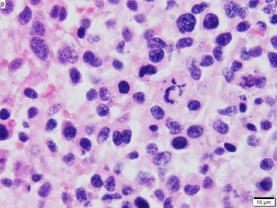.jpg?width=293&name=1024px-Cytomegalovirus_infection_(3785988653).jpg) Organ transplants are common surgeries that happen around the world. In the United States, more than 33,000 transplants occurred in 2016, with more than half of these being kidney transplants. Although the majority of people come out of transplant surgery with no problems, many develop serious infections caused by the common virus cytomegalovirus (CMV)when the immune system rejects the new kidney.
Organ transplants are common surgeries that happen around the world. In the United States, more than 33,000 transplants occurred in 2016, with more than half of these being kidney transplants. Although the majority of people come out of transplant surgery with no problems, many develop serious infections caused by the common virus cytomegalovirus (CMV)when the immune system rejects the new kidney.
Tags: CA, new research funding, LAVS, UCLA, Biotechnology Vendor Showcase, NIH funding, 2017, cytomegalovirus
 Lymphoma is one of the most common types of cancer, with Non-Hodgkin Lymphoma making up about 4% of all cancer cases in the United States, according to the American Cancer Society. Although treatment methods like chemotherapy and radiation therapy are able to treat the cancer, researchers still actively study this cancer to gain a better understanding of it to develop new targeted treatment methods.
Lymphoma is one of the most common types of cancer, with Non-Hodgkin Lymphoma making up about 4% of all cancer cases in the United States, according to the American Cancer Society. Although treatment methods like chemotherapy and radiation therapy are able to treat the cancer, researchers still actively study this cancer to gain a better understanding of it to develop new targeted treatment methods.
Researchers from the Center for Cell and Gene Therapy at Baylor College of Medicine, Texas Children's Hospital and Houston Methodist Hospital have been studying new therapies for the cancer using T-cells, research that they will continue with the assistance of a new $11.5 million grant from the National Cancer Institute. (Image courtesy of TexasPathologistMSW ia Wikimedia Commons)
Read MoreTags: new research funding, cancer research, Texas Medical Center, tmc, Houston, TX, NIH funding, 2018, Lymphoma, Baylor College of Medicine
 Valley Fever affects nearly 10,000 people in the United States each year, predominately in the Southwestern states of Arizona and California. This infection, caused by the fungus Coccidioide, affects different people in different ways: some get very ill while others are only mildly affected. However people are affected, there is no vaccine to cure the infection. A team of researchers from the University of Arizona, Tucson recently received a $4.8 million grant from the National Institute of Allergy and Infectious Disease (NIAID) to develop a vaccine for Valley Fever.
Valley Fever affects nearly 10,000 people in the United States each year, predominately in the Southwestern states of Arizona and California. This infection, caused by the fungus Coccidioide, affects different people in different ways: some get very ill while others are only mildly affected. However people are affected, there is no vaccine to cure the infection. A team of researchers from the University of Arizona, Tucson recently received a $4.8 million grant from the National Institute of Allergy and Infectious Disease (NIAID) to develop a vaccine for Valley Fever.
Tags: new research funding, AZ, UAZ, BioResearch Product Faire Event, Tucson, NIH funding, University of Arizona Tucson, 2017, Valley Fever
 Sight is something that a majority of the population will never have to worry about losing. However, many diseases threaten sight, like age-macular degeneration (AMD). This degenerative disease becomes more likely with older age, and causes a loss of central vision in the retina. In the United States more than 10 million people suffer from AMD, the majority of those aged 55 and older.
Sight is something that a majority of the population will never have to worry about losing. However, many diseases threaten sight, like age-macular degeneration (AMD). This degenerative disease becomes more likely with older age, and causes a loss of central vision in the retina. In the United States more than 10 million people suffer from AMD, the majority of those aged 55 and older. Tags: new research funding, AZ, UAZ, BioResearch Product Faire Event, Tucson, University of Arizona Tucson, 2017, macular degeneration
 For life science researchers, having easy access to data and information is essential. They can use this data to research diseases and further personal research, benefiting other researchers and patients. Oregon Health and Science University in Portland recently received a five-year grant of $15 million from the National Institutes of Health to establish a first-of-its-kind database to contain pediatric cancer and rare disease research. (Image courtesy of I, Cacophony via Wikimedia Commons)
For life science researchers, having easy access to data and information is essential. They can use this data to research diseases and further personal research, benefiting other researchers and patients. Oregon Health and Science University in Portland recently received a five-year grant of $15 million from the National Institutes of Health to establish a first-of-its-kind database to contain pediatric cancer and rare disease research. (Image courtesy of I, Cacophony via Wikimedia Commons)
Tags: Oregon Health and Science University, new research funding, Computational Biology, OHSU, Portland, Knight Cancer Institute, 2017
Rockefeller University received a $25 million gift from the Robertson Foundation that will be used to create the Robertson Therapeutic Development Fund. This fund will be used to help turn basic research discoveries into new medical therapies by providing support for dozens of Rockefeller projects over the next five years. Research grants ranging from $10,000 to $1 million will be awarded from the fund in order to provide Rockefeller scientists with the resources they need to take exceptionally promising research initiatives through the steps that lead to breakthrough medications, new diagnostic tests or other clinical innovations.
Read MoreTags: Rockefeller University, Bioresearch funding, Biotech Event, new research funding, RockU, Biotechnology Vendor Fair, Research Funding, Rockefeller, research news, Biotechnology trade show
Dr. Madelaine Bartlett, a biologist at the University of Massachusetts in Amherst, recently received a four-year $4 million grant from the National Science Foundation. The new research funding will allow Barlett and colleagues from UMass and other institutions to study the genes that regulate plant stem cell biology and their effect on fruit size and yield.
Read MoreTags: Stem cell research, University of Massachusetts Amherst, University of Massachusetts, agriculture, new research funding, Massachusetts, agricultural, MA, Northeast Region, UMASS, new research grant, NSF funding, NSF grant, NSF award, Plant Biology, agricultural business, agribusiness
University of South Florida Nursing’s professor, Maureen Groer, PhD recently received funding to extend her research on preterm infants and the microbiome of their digestive system. This research grant from the National Institute of Health (NIH) is part of a $150 million program called Environmental influences on Child Health Outcomes (ECHO). The focus of ECHO is to allow researchers to study the impact that environmental influences have on children by extending and expanding existing studies on mothers and their children. It will involve 50,000 children the across the United States.
Read MoreTags: new research funding, environmental contaminants, Environment, Florida, Research Funding, Southern Region, new research grant, University of South Florida, USF
Researchers at the University of Colorado Boulder have received a $1.1 million grant from the Bill & Melinda Gates Foundation to support development of next-generation vaccines. If the project is successful, these new vaccines will be able to defend against diseases with just one shot and won't need to be refrigerated. These improvements could have an immense impact on the difficult challenge of dispensing life-saving immunizations.
Read MoreTags: University of Colorado, vaccine, new research funding, vaccine research, University of Colorado Boulder, Colorado, new research grant
The $10 million gift from Andrew M. and Jane M. Bursky will advance cutting-edge research at the newly named Andrew M. and Jane M. Bursky Center for Human Immunology and Immunotherapy Programs. Research at the center focuses on harnessing the immune system to fight cancer, infectious diseases, and autoimmune disorders.
Read More
Tags: Washington University, Missouri, Washington University in St. Louis, new research funding, cancer research, infectious diseases, Immune System, MO, Midwest Region, immune system research, Washington Univsersity St. Louis, cancer therapy

